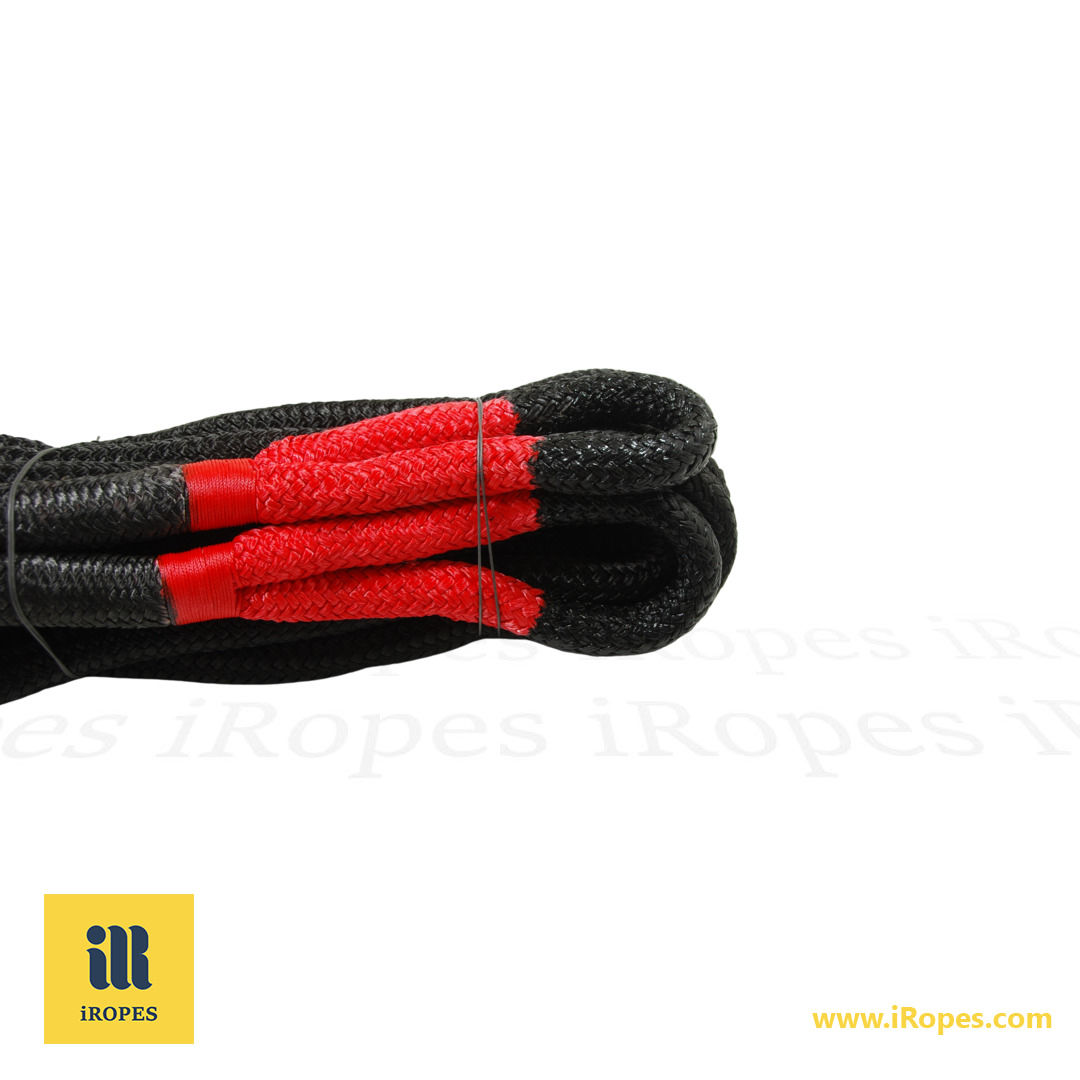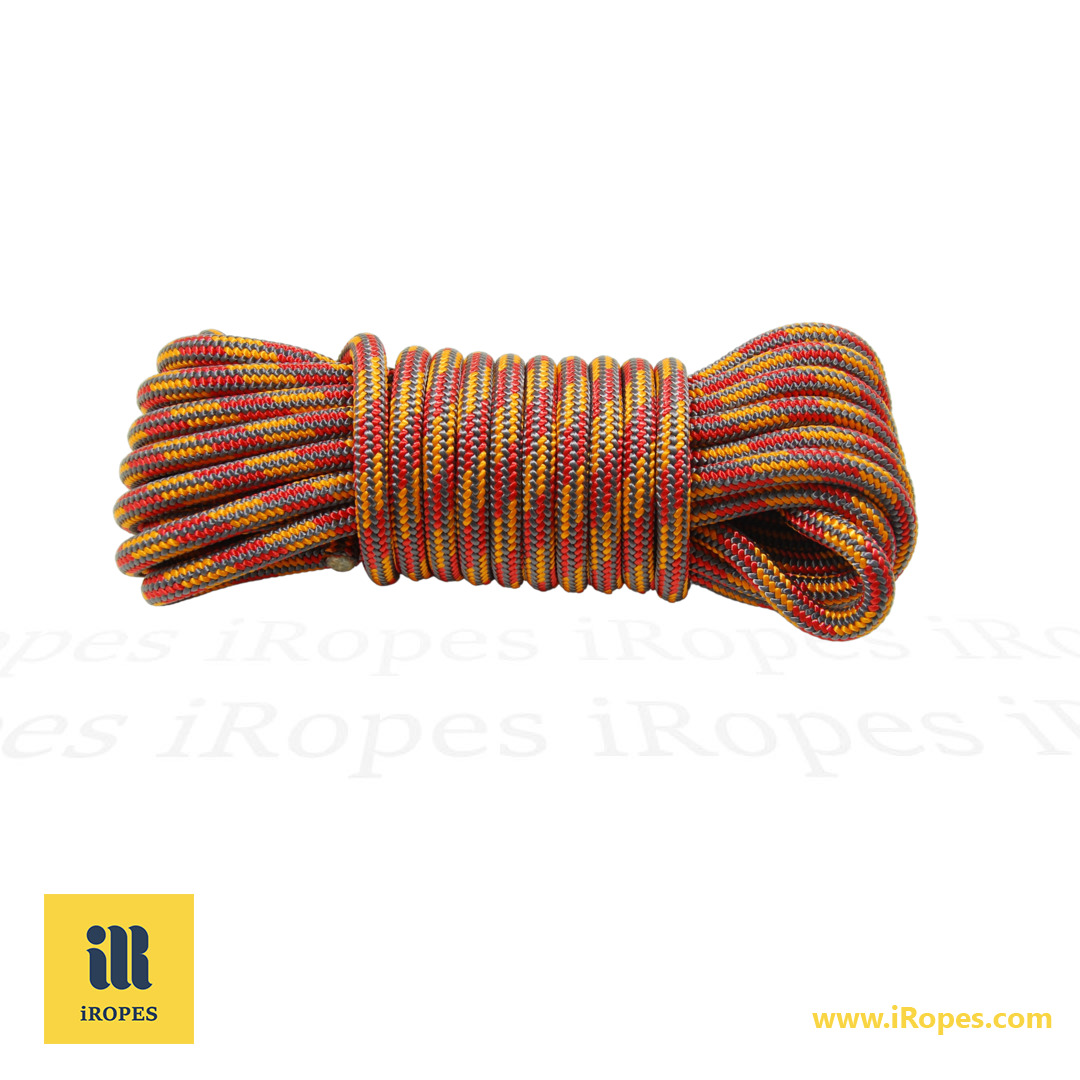Have you ever wondered what stands between you and a catastrophic equipment failure when scaling a cliff or securing a heavy load? The answer lies in the invisible hero of the rope world: tensile strength. At iRopes, we're not just passionate about ropes; we're obsessed with pushing them to their limits to ensure your safety.
Imagine a laboratory where cutting-edge technology meets meticulous craftsmanship. That's where our story of nylon rope tensile strength begins. With our state-of-the-art testing equipment and rigorous quality control processes, we're revolutionising the way rope durability is measured and guaranteed.
In this post, we'll take you behind the scenes of our professional nylon rope testing facilities, where each batch undergoes strict scrutiny. We'll explore how our commitment to excellence translates into ropes that don't just meet industry standards—they exceed them. Whether you're an adventure enthusiast or a industry professional, understanding the science behind rope strength could be the knowledge that saves lives.
Join us as we unravel the mysteries of nylon rope tensile strength and discover why, when it comes to safety and reliability, iRopes is leading the charge in rope manufacturing innovation. iRopes’ coating cover on the whole rope,very good abrasion. Longer use life extra
iRopes’ coating cover on the whole rope,very good abrasion. Longer use life extra
with 100mm length black rubber cover until thread wrap part PU different color
Coating very good abrasion.avaliable in different eye colour .
MATERIAL: Nylon core Nylon cover
CONSTRUCT: double braided
ELONGATION: 30%
Professional Nylon Rope Tensile Strength Testing Equipment
At iRopes, we understand that the backbone of any high-quality rope lies in its tensile strength. That's why we've invested in state-of-the-art testing facilities and equipment to ensure our nylon ropes meet the highest standards of durability and safety. Let me walk you through our professional setup and why it matters for you, our valued customers.
Types of Tensile Testing Machines for Nylon Ropes
Imagine a laboratory where the air hums with the quiet power of precision machinery. That's what you'd experience if you stepped into our testing facility. We use two primary types of tensile testing machines:
- Universal Testing Machines (UTMs): These versatile workhorses can test ropes of various diameters and lengths. They're like the Swiss Army knives of rope testing, capable of applying controlled tension until the rope reaches its breaking point.
- Horizontal Tensile Testers: Perfect for longer ropes, these machines stretch out ropes horizontally, mimicking real-world conditions more closely. It's like watching a tug-of-war in slow motion, but with scientific precision.

Importance of Accurate Tensile Strength Measurements in Rope Manufacturing
You might be wondering, "Why all this fuss about tensile strength?" Well, let me put it this way: imagine you're scaling a cliff face, and your life literally hangs by a thread – or in this case, a rope. That's why accurate measurements are non-negotiable.
Our testing process considers crucial parameters like load capacity, stroke length, and testing speed. We adhere strictly to NFPA standards for rope classification and testing, ensuring that every nylon rope that leaves our facility is up to the task, whether it's for off-road adventures or industrial applications.
Did you know? Tensile strength measures a rope's resistance to breaking under tension. It's the backbone of rope reliability and safety.
Our experienced technicians don't just run tests; they interpret results, fine-tune processes, and ensure that every batch of nylon rope meets our rigorous quality standards. It's this attention to detail that sets iRopes apart and gives you peace of mind when you choose our products.
Have you ever wondered about the science behind rope strength? Or perhaps you're curious about how our testing compares to what you've seen elsewhere? Drop us a line – we're always excited to share our passion for rope quality and safety with fellow enthusiasts and professionals alike.
Strict Testing and Quality Inspection for Rope Orders
At iRopes, we take rope safety seriously. Every batch of nylon rope that leaves our facility undergoes rigorous testing and quality inspection. It's not just about meeting industry standards; it's about exceeding them to ensure your safety and satisfaction.
Comprehensive Batch Testing Process
Picture this: a bustling laboratory where our dedicated team meticulously examines each rope batch. Our comprehensive testing process involves several key steps:
- Tensile strength testing: We push each rope to its limits, measuring its breaking point under controlled conditions.
- Abrasion resistance checks: Our ropes are subjected to simulated wear and tear to ensure they can withstand real-world conditions.
- UV resistance evaluation: We expose samples to intense UV light, mimicking years of sun exposure in a matter of weeks.
These tests aren't just box-ticking exercises. They're our way of ensuring that when you're dangling from a cliff face or securing heavy machinery, your rope won't let you down.

Regular Inspection Intervals for Wire Ropes
While our focus is on nylon ropes, we understand the importance of wire rope inspections too. Industry standards recommend wire rope inspections at least every 12 months, but we encourage more frequent checks for high-stress applications.
Our inspection process includes:
- Visual examinations: We look for signs of wear, corrosion, or damage that could compromise rope integrity.
- Tactile assessments: Our experienced technicians can often feel irregularities that might be missed by the naked eye.
- Advanced non-destructive testing: For wire ropes, we employ Magnetic Rope Testing (MRT) to detect internal flaws without damaging the rope.
Did you know? Strength loss in synthetic fiber ropes is often related to broken fibers. That's why our inspection process is so thorough - we're looking for the tiniest signs of wear.
By maintaining these strict quality control measures, we ensure that every rope that bears the iRopes name is ready to face the toughest challenges. After all, when it comes to rope safety, there's no room for compromise.
Have you ever wondered what goes on behind the scenes in rope manufacturing? Or perhaps you're curious about how often you should be inspecting your own ropes? Drop us a line - we're always happy to share our expertise and help you make informed decisions about rope safety and maintenance.
Nylon vs Polypropylene Rope: Tensile Strength Comparison
When it comes to choosing the right rope for your needs, understanding the tensile strength of different materials is crucial. Let's dive into the world of nylon and polypropylene ropes, comparing their strengths and characteristics to help you make an informed decision.
Understanding Tensile Strength in Rope Materials
Tensile strength is the maximum stress a rope can withstand while being stretched before breaking. It's like the rope's breaking point, if you will. Several factors influence a rope's tensile strength:
- Diameter: Generally, thicker ropes have higher tensile strength.
- Construction: The way the rope is braided or twisted affects its strength.
- Environmental conditions: Factors like UV exposure and moisture can impact rope performance.
It's worth noting that while we're focusing on nylon and polypropylene, there are even stronger materials out there. For instance, HMPE/Dyneema ropes boast strength-to-weight ratios that surpass steel!
Nylon Rope Characteristics and Strength
Nylon ropes are like the dependable workhorses of the rope world. They offer a fantastic balance of strength and flexibility. Here's what makes nylon stand out:
- Superior shock absorbency: Nylon can stretch and recover, making it ideal for dynamic loads.
- Excellent wet strength retention: Unlike some materials, nylon maintains much of its strength when wet.
- High tensile strength: A 10mm nylon rope typically has a tensile strength of around 3,000-3,500 lbs.
These properties make nylon ropes perfect for climbing, boating, and heavy-duty industrial applications where shock absorption is crucial.
Polypropylene Rope Properties and Performance
Polypropylene ropes have their own set of strengths that make them suitable for specific applications:
- Excellent buoyancy: These ropes float, making them ideal for marine use.
- High chemical resistance: Polypropylene stands up well to many chemicals and oils.
- Moderate tensile strength: A 10mm polypropylene rope typically has a tensile strength of about 2,000-2,500 lbs.
While polypropylene may not match nylon in raw strength, it excels in scenarios where water resistance and chemical stability are paramount.
Rope Strength Comparison
Nylon: 3,000-3,500 lbs vs Polypropylene: 2,000-2,500 lbs (10mm diameter)
Remember, these figures are general guidelines. The actual tensile strength can vary based on specific manufacturing processes and rope designs. When selecting a rope, always consider the intended use and environmental conditions.
Have you ever experienced the difference between nylon and polypropylene ropes in action? Whether you're an avid sailor, a rock climbing enthusiast, or work in an industry that relies heavily on rope strength, understanding these differences can be a game-changer.
At iRopes, we're passionate about providing the right rope for every job. Our rigorous testing ensures that whether you choose nylon for its shock absorption or polypropylene for its buoyancy, you're getting a product that meets the highest standards of quality and safety.
Pro Tip: When choosing between nylon and polypropylene, consider not just the tensile strength, but also the specific demands of your application. Sometimes, factors like UV resistance or chemical stability can be just as important as raw strength.
Curious about which rope is best for your specific needs? Or perhaps you have a unique application that requires a custom solution? Don't hesitate to reach out. Our team of rope experts is always ready to help you navigate the world of high-performance synthetic ropes.
Understanding Rope Tensile Strength for Customer Satisfaction
At iRopes, we believe that customer satisfaction is deeply rooted in understanding the technical aspects of our products. Let's dive into the world of rope tensile strength and how it directly impacts your safety and peace of mind.
Defining Rope Tensile Strength and Its Importance
Imagine you're scaling a cliff face or securing a heavy load. In these moments, the strength of your rope isn't just a number—it's your lifeline. Rope tensile strength is the maximum stress a rope can withstand before breaking. It's like the rope's personal best in a tug-of-war against gravity and force.
But here's the catch: the tensile strength isn't the same as the safe working load. Think of it this way:
- Tensile strength is the rope's breaking point under perfect conditions.
- Working load limit is what you can safely use day-to-day, typically a fraction of the tensile strength.
We always recommend using a rope with a tensile strength several times higher than your expected load. It's like having a safety net under your safety net.
Pro Tip: The working load limit is usually 10-20% of the rope's tensile strength. Always check the manufacturer's guidelines for specific ratios.
Factors Affecting Rope Performance and Safety
Your rope's performance isn't just about its initial strength. It's a living thing, affected by its environment and how you treat it. Here are some factors that can impact your rope's tensile strength over time:
- UV exposure: Sunlight can degrade synthetic fibres, weakening the rope.
- Moisture: Some ropes lose strength when wet, while others, like nylon, maintain their integrity.
- Abrasion: Rough surfaces can wear down the rope's fibres, reducing its strength.
- Chemical exposure: Certain chemicals can react with rope materials, compromising their integrity.
To ensure your rope maintains its tensile strength, follow these care tips:
- Store properly: Keep your rope in a cool, dry place away from direct sunlight when not in use.
- Clean regularly: Gently wash your rope with mild soap and water to remove dirt and salt.
- Inspect often: Before each use, check for signs of wear, cuts, or abrasions.
- Retire responsibly: If in doubt about your rope's condition, it's better to replace it than risk failure.
Remember, a well-maintained rope isn't just about longevity—it's about ensuring your safety in critical moments.

At iRopes, we're committed to not just selling you a rope, but ensuring you have the knowledge to use it safely and effectively. Our rigorous testing processes and quality control measures are designed with your satisfaction and safety in mind.
Have you ever experienced a situation where understanding rope tensile strength made a crucial difference? We'd love to hear your stories and answer any questions you might have about choosing the right rope for your needs. Drop us a line—after all, your safety is our top priority.
Discover the Ultimate in Nylon Rope Tensile Strength Testing
At iRopes, we prioritise maximum durability and safety by using top-tier professional nylon rope tensile strength testing equipment. Our state-of-the-art facilities ensure that each batch of rope undergoes strict testing and quality inspection, adhering to industry standards. Through comprehensive testing procedures and meticulous quality control, our experienced technicians guarantee high-performing, durable ropes. We also offer a comparison of nylon rope tensile strength with polypropylene rope tensile strength to help you choose the best fit for demanding applications. Fill in the form above to learn more about our rigorous testing processes and how we ensure customer satisfaction with reliable rope tensile strength.